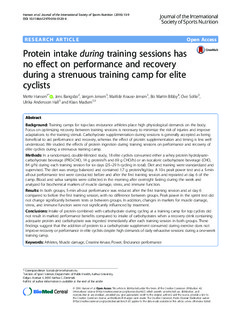| dc.contributor.author | Hansen, Mette | |
| dc.contributor.author | Bangsbo, Jens | |
| dc.contributor.author | Jensen, Jørgen | |
| dc.contributor.author | Krause-Jensen, Matilde | |
| dc.contributor.author | Bibby, Bo Martin | |
| dc.contributor.author | Sollie, Ove | |
| dc.contributor.author | Hall, Ulrika Andersson | |
| dc.contributor.author | Madsen, Klavs | |
| dc.date.accessioned | 2017-02-01T10:10:13Z | |
| dc.date.available | 2017-02-01T10:10:13Z | |
| dc.date.issued | 2016-03-05 | |
| dc.identifier.citation | Journal of the International Society of Sports Nutrition. 2016, 13. doi: 10.1186/s12970-016-0120-4 | nb_NO |
| dc.identifier.issn | 1550-2783 | |
| dc.identifier.uri | http://hdl.handle.net/11250/2429129 | |
| dc.description.abstract | Background: Training camps for top-class endurance athletes place high physiological demands on the body. Focus on optimizing recovery between training sessions is necessary to minimize the risk of injuries and improve adaptations to the training stimuli. Carbohydrate supplementation during sessions is generally accepted as being beneficial to aid performance and recovery, whereas the effect of protein supplementation and timing is less well understood. We studied the effects of protein ingestion during training sessions on performance and recovery of elite cyclists during a strenuous training camp. Methods: In a randomized, double-blinded study, 18 elite cyclists consumed either a whey protein hydrolysatecarbohydrate beverage (PRO-CHO, 14 g protein/h and 69 g CHO/h) or an isocaloric carbohydrate beverage (CHO, 84 g/h) during each training session for six days (25–29 h cycling in total). Diet and training were standardized and supervised. The diet was energy balanced and contained 1.7 g protein/kg/day. A 10-s peak power test and a 5-min all-out performance test were conducted before and after the first training session and repeated at day 6 of the camp. Blood and saliva samples were collected in the morning after overnight fasting during the week and analyzed for biochemical markers of muscle damage, stress, and immune function. Results: In both groups, 5-min all-out performance was reduced after the first training session and at day 6 compared to before the first training session, with no difference between groups. Peak power in the sprint test did not change significantly between tests or between groups. In addition, changes in markers for muscle damage, stress, and immune function were not significantly influenced by treatment. Conclusions: Intake of protein combined with carbohydrate during cycling at a training camp for top cyclists did not result in marked performance benefits compared to intake of carbohydrates when a recovery drink containing adequate protein and carbohydrate was ingested immediately after each training session in both groups. These findings suggest that the addition of protein to a carbohydrate supplement consumed during exercise does not improve recovery or performance in elite cyclists despite high demands of daily exhaustive sessions during a one-week training camp. | nb_NO |
| dc.language.iso | eng | nb_NO |
| dc.publisher | BioMed Central | nb_NO |
| dc.subject | athletes | nb_NO |
| dc.subject | muscle damage | nb_NO |
| dc.subject | creatine kinase | nb_NO |
| dc.subject | power | nb_NO |
| dc.subject | endurance performance | nb_NO |
| dc.title | Protein intake during training sessions has no effect on performance and recovery during a strenuous training camp for elite cyclists | nb_NO |
| dc.type | Academic article | nb_NO |
| dc.subject.nsi | VDP::Medisinske Fag: 700::Helsefag: 800::Ernæring: 811 | nb_NO |
| dc.subject.nsi | VDP::Medisinske Fag: 700::Idrettsmedisinske fag: 850 | nb_NO |
| dc.source.journal | Journal of the International Society of Sports Nutrition (JISSN) | nb_NO |
| dc.identifier.doi | 10.1186/s12970-016-0120-4 | |
| dc.description.localcode | Seksjon for fysisk prestasjonsevne / Department of Physical Performance | nb_NO |
